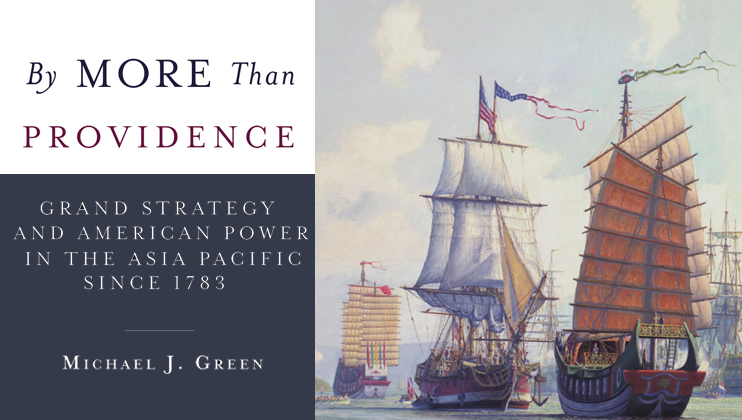Tuesday, March 28, 2017 | 5:30 PM EDT - 7:00 PM EDT
Dorsey and Whitney LLP |, New York, NY
American strategic engagement with the Asia Pacific has deep roots in American history, going back to the nation’s founding. Despite the difficulties of formulating and maintaining a coherent grand strategy amid democratic competition, the United States has, over more than 200 years, developed a distinctive approach to the region based on its interests and national identity. In a new book, By More Than Providence: Grand Strategy and American Power in the Asia Pacific Since 1783, Center for Strategic and International Studies and Georgetown University expert Michael Green argues that American strategic thinking towards Asia has been defined by the fear that a rival power might seek to exclude the United States from the western Pacific, preventing the free flow of trade and ideas.
In By More than Providence, Dr. Green fills an important gap in existing scholarship on the strategic calculus in East Asia. Through examination of the thinking of America’s greatest statesmen and strategists and by outlining the development of U.S. grand strategy towards Asia, he adds a crucial element to our understanding of the balance of power in the region, and to what is at stake in American engagement there today. On March 28, 2017, Dr. Green joined National Committee President Stephen A. Orlins in New York City for a discussion of the history of American strategy in Asia, and the most pressing contemporary strategic challenges our country faces in the region.

Michael Green
Michael Green is senior vice president for Asia and Japan Chair at the Center for Strategic and International Studies (CSIS) and chair in modern and contemporary Japanese politics and foreign policy at the Edmund A. Walsh School of Foreign Service at Georgetown University. He served on the staff of the National Security Council (NSC) from 2001 through 2005, first as director for Asian affairs, with responsibility for Japan, Korea, Australia, and New Zealand, and then as special assistant to the president for national security affairs and senior director for Asia, with responsibility for East Asia and South Asia. Before joining the NSC staff, he was senior fellow for East Asian security at the Council on Foreign Relations, director of the Edwin O. Reischauer Center, and director of the Foreign Policy Institute. He has served as an assistant professor at the Paul H. Nitze School of Advanced International Studies (SAIS) at Johns Hopkins University, a research staff member at the Institute for Defense Analyses, and senior adviser on Asia in the Office of the Secretary of Defense. He also worked in Japan on the staff of a member of the National Diet.
Dr. Green is currently a nonresident fellow at the Lowy Institute in Sydney, Australia, and a distinguished scholar at the Rebuild Japan Initiative Foundation in Tokyo. He is a member of the Council on Foreign Relations, the Aspen Strategy Group, the America Australia Leadership Dialogue, the advisory board of the Center for a New American Security, and the editorial boards of the Washington Quarterly and the Journal of Unification Studies in Korea. He is also an associate of the U.S. Intelligence Community. Dr. Green has authored numerous books and articles on East Asian security. His current research includes a survey of elite views of norms, power, and regional institutions in Asia; and a monograph on Japanese strategic culture.
Dr. Green received his master’s and doctoral degrees from SAIS and did additional graduate and postgraduate research at Tokyo University and the Massachusetts Institute of Technology. He received his bachelor’s degree in history from Kenyon College with highest honors.
